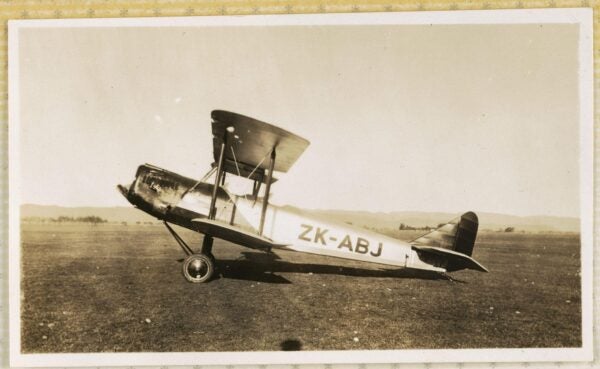Call Me Future Pilot

Unknown. Biplane. From the Album: James Cane Photograph Album. circa 1930s. Museum of New Zealand – Te Papa Tongarewa.
I submitted an essay last year from a jail cell. I am a current student at CUNY to earn a degree that will help me become a commercial pilot. This essay works for both prompts, because what people call me and what I wish people knew about being through the system are related. Something that happened while I was a homeless teenager is impacting what choices I have for the rest of my life. A lot of the programs that were supposed to help me didn’t care about me. One person at one of the reentry programs didn’t laugh at me when I said I wanted to be a pilot and connected me to others who could help me get the aviation education I need. That program abandoned me when I went back into the system but that lady did not.
I have one ambitious dream to become a pilot certified by the Federal Aviation Administration (FAA). By the time I was 16, I had been homeless for years and got locked up. That felony has stuck with me and as soon as I had that record, trying to finish school, keep my own apartment, and comply with parole was hard. I was able to get through high school, but having that felony changed everything about my life more than a high school diploma. That felony is ruling the next fifty years of my life. Stop calling me a felon, convict, criminal or troubled youth. Call me a future pilot.
After I was released the first time I found an organization that served justice-impacted women who wanted to get into college. I didn’t think I could be a pilot, and said I wanted to be an aeronautical engineer instead. Most people laughed at me, but there were two women who had been through the system who I looked up to as mentors. They got out, earned degrees, and I thought that if they could do it, I could too. But I noticed that despite their qualifications, they never got promoted. They always got passed over in favor of people who didn’t have records. These organizations that were supposed to be safe spaces for us stigmatized their staff because of their past. Institutions that claim to support rehabilitation and second chances don’t really mean it, so how am I going to fare with a government licensing agency like the FAA?
Becoming a commercial pilot has hurdles beyond the FAA licensing. Employment policies of airlines have moral turpitude clauses, which is vague criteria that can mean almost anything. These clauses also prevent people with felonies from becoming teachers or doctors. I also would have to pass a background check from the Department of Homeland Security. Truck driving also requires a commercial license, but unlike a pilot’s license, there is no moral turpitude clause preventing me from being a truck driver, but I want to fly.
These are systemic barriers most people don’t see and I wish people would look at the societal and institutional barriers that need addressing, questioning the authenticity of the so-called second chances often proclaimed. My dream of becoming a commercial pilot can’t come true until people in power agree that my past does not define my capabilities or my future.
I continue my studies with determination and the reality that I may not get a commercial pilot’s license. Maybe I will wind up with a private pilot license, and will work at Air Traffic Control so I can be around the jetliners I won’t have the opportunity to fly. For the second time in 4 years, I saw my mentor get passed over for a leadership role at a different organization. She did that job for 6 months and kept the program afloat, then they brought in someone who studied incarceration but have never lived it to run it. Seeing this made me wonder why I bother going to school and try to be better if these programs never see her as anything beyond a felon. It’s demoralizing, but I am still hoping for a future where I am recognized for my skills and achievements, instead of a label affixed to my name. I am more than what happened to me at 16. I am a future pilot.
Editor’s Note: While this essay initially drew my attention because I love all things aviation, it touches on themes that could fill a book. Elisha sheds light on the societal failures that force homeless children into juvenile detention and impose lifelong vocational barriers on young people with convictions. This societal neglect did not protect Elisha from being unhoused, yet holds her accountable for the consequences. Furthermore, the reentry programs that should model inclusiveness often can marginalize staff members with past convictions. My own experience working for a reentry organization confirms that these workers frequently provide crucial support beyond their job scope, underscoring a business model in many organizations that relies too heavily on employees’ dedication rather than genuine organizational support. This is visible to clients. Additionally, the essay discusses systemic employment barriers in competitive fields like aviation, where those with convictions are often excluded early in candidate screenings. Ironically, attributes developed through challenging life experiences—such as heightened vigilance and adaptability—are precisely what would make her an exceptional pilot, capable of managing the intense demands of flying. Ultimately, when safety is paramount, the question isn’t about a pilot’s past but their ability to land safely. I hope Elisha checks back in when she gets her wings.